Japan, We Love You (And You Did Not Bring Us Down)
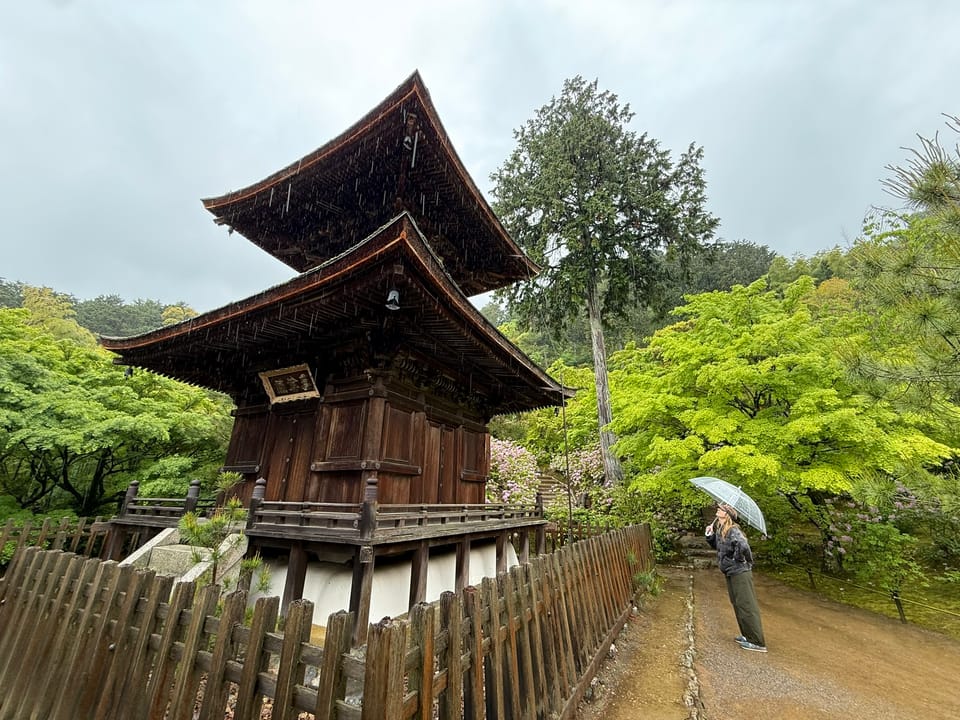
My wife and I returned from our honeymoon in Japan in early May. To everyone that made that possible via the wedding or otherwise, you gave us one of the greatest gifts we could ever ask for: the gift of travel, culture, and yet another journey we can look back at and say we did that, together.
To that I say…thank you.
We visited Tokyo and Kyoto and then returned to Tokyo for one night, staying in mostly hotels and one AirBnb with...challenging sleeping arrangements. For us at least! The floor/futon combo at 37 was nothing short of brutal on our backs but luckily, the host was the nicest woman in the world with plenty of other futons stored away for us.
The trip and honeymoon was a much-needed peak into the multitudinous ways of living and interacting with people that, if we didn’t have the chance to travel, would never have happened. This opened up the aperture of our humanity in ways I remember being so overwhelmingly positive as a kid from the few years I traveled and lived abroad proving, yet again, getting out into the world is much better than staying in one's own bubble.
But, as Newton's Third Law of Motion states, "For every action, there is an equal and opposite reaction." This truth was an initial concern for us: the potential for burden, exploitation, and intrusion on the people of Japan, all of which we tried our best to manage, weighed on our minds. We really didn't want to be too much of a bother. To mitigate this anxiety, we tried our best to remember that travel was hard, not just in the physical parts but also in the social and psychological aspects as well. This friction came with the journey, the ordeal of growth, which chef, travel writer, and TV host Anthony Bourdain said best: "It seems that the more places I see and experience, the bigger I realize the world to be. The more I become aware of, the more I realize how relatively little I know of it, how many places I have still to go, how much more there is to learn." We were fortunate to receive that gift of realization, and it was an honor to share it in such a hospitable manner with the gracious people of Japan.
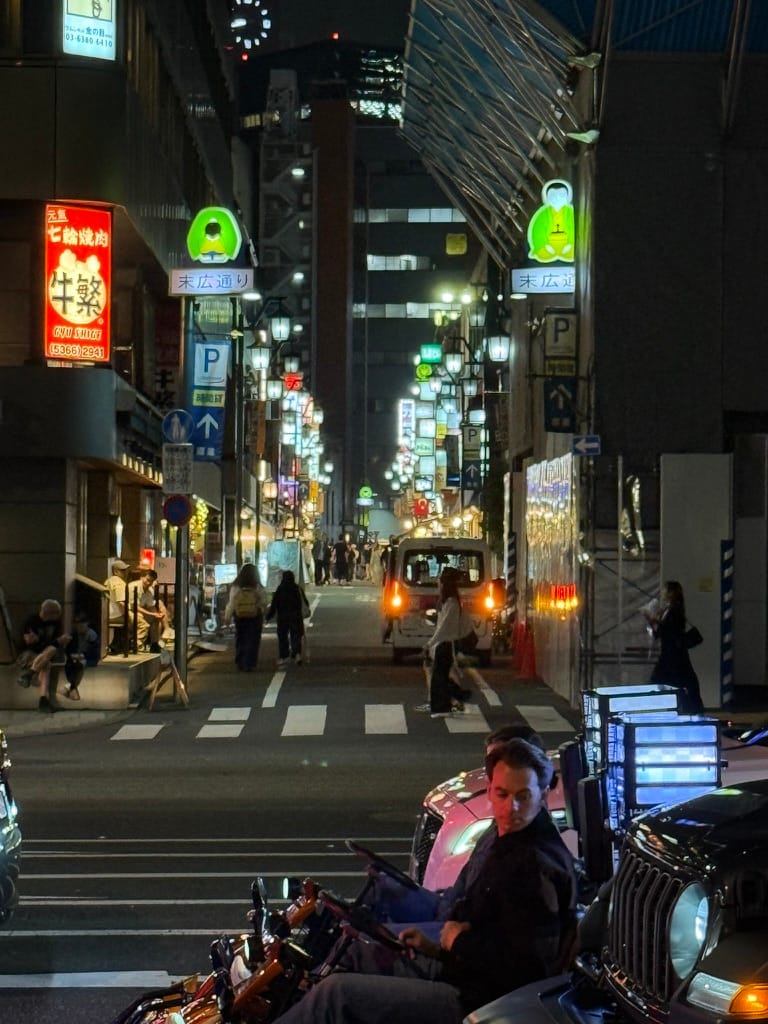
I'm still feeling one thing: starved and left wanting for Japan's culture of unreal infinitude and spontaneous captures of stillness and mania. Around every street corner and alleyway, day or night, something was happening. From waiting for the bus outside a Lawson or 7-Eleven in the rain next to one smiling stranger I knew we would never see again to a centuries-old restaurant serving only us to a hidden izakaya where literally no one knew our names, something was always happening. And the old-school taxi cabs with massive side mirrors and no seat belts, to museums with endless history for $5 all-you-can-walk, or the hundreds of hundreds of towering castles and temples tucked away in the cities memories like old friends you'll always love, and all of it with trains, buses, scooters, people people people moving around below, the modern world there felt anchored by an unwavering, unquestionable commitment to its own unshakeable foundation, proud and chest out felt in flashes upon flashes upon flashes, blinding us, everyday we were there, in its might, its majesty - its enduring ways.
This newsletter will be a little different. I'm going to include three short essays about my favorite moments from the trip. Once I get my notes in order, I am planning to write a more formal essay about the 12 or so days we spent there.
Cheers, and thank you everyone.
Silence and Sound
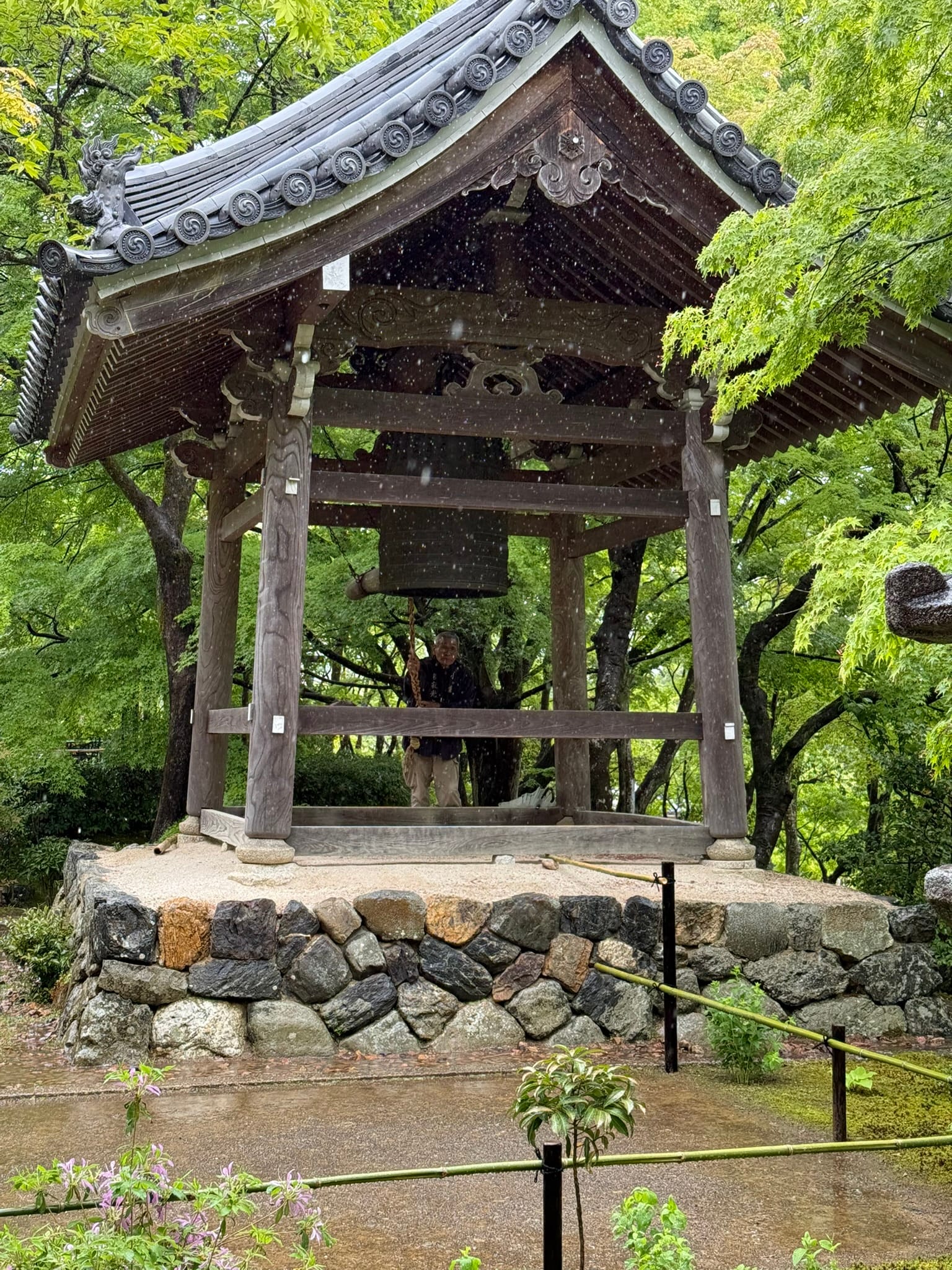
I first spotted the bell-man as he exited the men's bathroom. It was a rainy day in Kyoto but we decided to trek it to the bamboo gardens anyway. Being a shorter excursion than we thought, we continued exploring until we accidentally passed by Jojakko-ji (常寂光寺) Gardens, located at Mount Ogura's slopes in Arashiyama, a district located on the western outskirts of the city.
I didn't know it yet, but Rakushisha, known as the "Hut of Fallen Persimmons," was nearby. It was once home of the poet Mukai Kyorai, a disciple of Matsuo Basho, who elevated what became known as the haiku.
I had to pee. It felt sacrilegious to be peeing in a 400-year-old temple (also known as the "temple without walls") covered in rolling, lime and dark green moss, Japanese maple leaves, Japanese ginkgo trees but if you know me, it has to happen, no question.
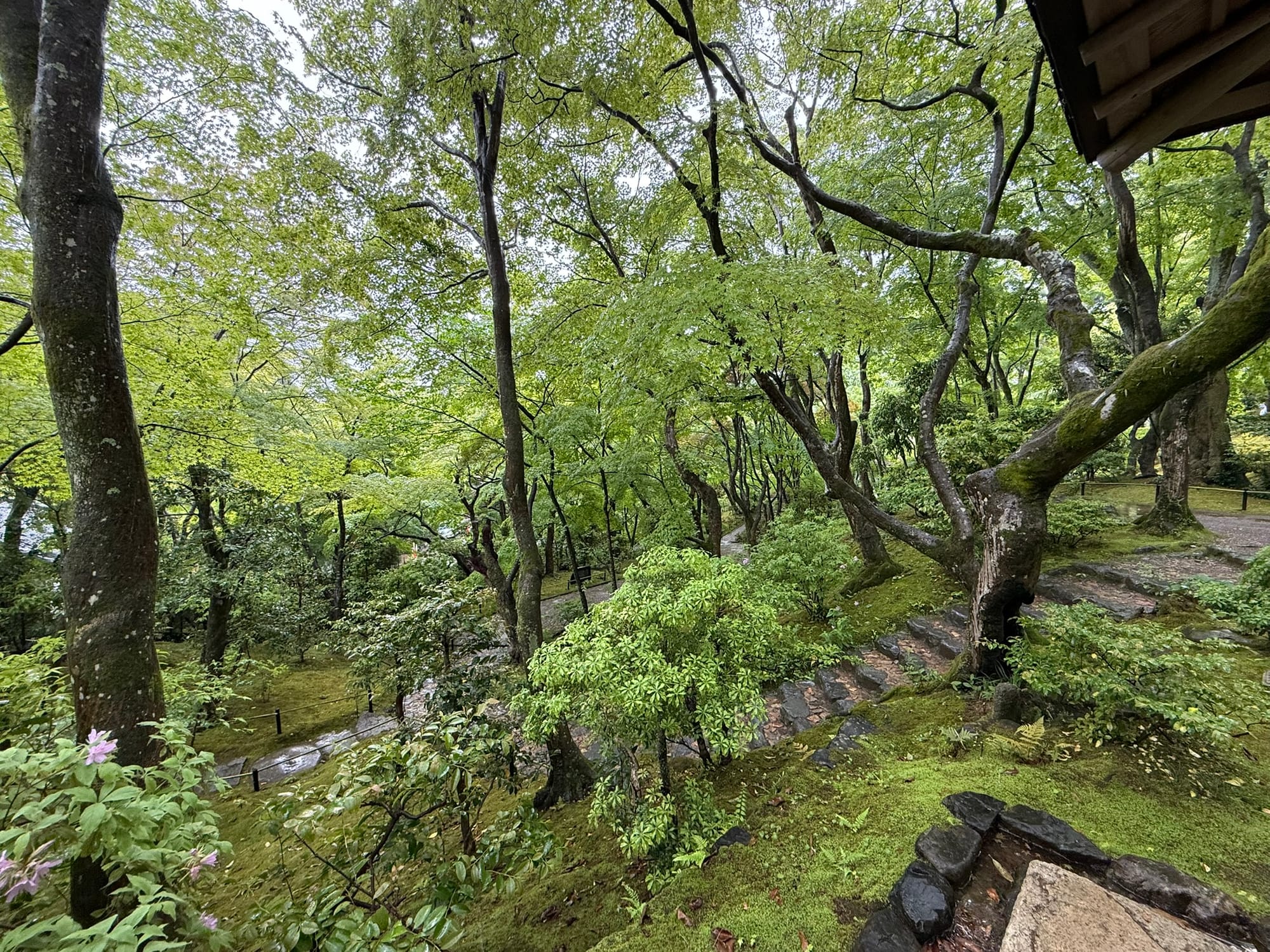
It appeared the bell-man did too, giving me a weird sense of solidarity with the man. As I passed him, he readjusted himself before fully entering the world from the can, I noticed he was wearing a simple, thick, dark blue happi coat with heavy-duty beige cargo pants. His boots were worn and wet from the rain that had been falling all day. The look on his face was stony, solemn, focused, and getting ready for something intense; something that had been done for a very long time.
Or maybe he was just raging about the rain.
Kyoto gets rain at an average of 115 to 215 days per year. For context, Hawaii gets around 273 rainy days per year. The bell-man was prepared, though, with durable, functional gear, and not a single label promoting Gore-Tex or NorthFace, just good old-fashioned cotton/polyester. Old school kind of guy.
I did my business and, after exiting, heard and then saw where the bellman had gone. Through the wet trees and branches, with only a few people around, the bell-man stood on a wooden footstool beside the temple's Bell Tower with a shoddy piece of rope in his hand. The bell was as a big as a full grown cow. The rope was tied to the base of a massive piece of wood - worn, splintered, and likely as tall as he was - and he was swinging this thing combo at the bell hanging from the center of the open wooden structure in a very powerful but slow and meditative way. The ringing came at evenly spaced intervals (though I never learned why). When the bell sounded, I was struck not by its vibration but by the sudden epiphany it triggered from nowhere.
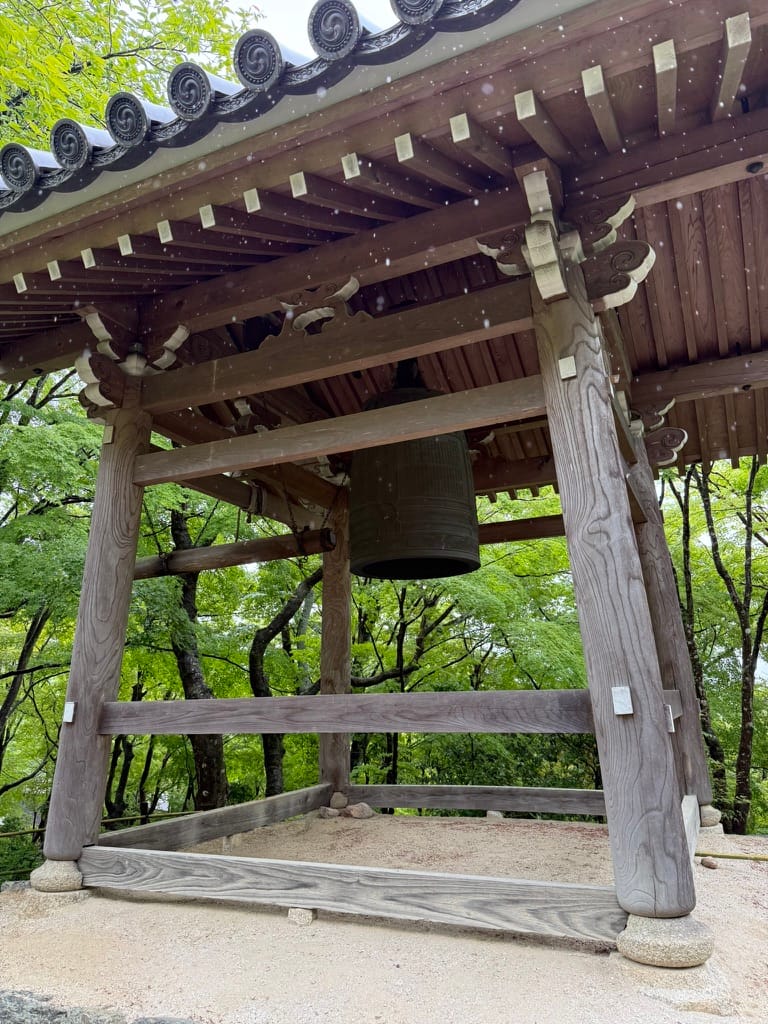
On one end, I felt and intellectualized the ringing of the bell as a way to honor the temple; the ringing as a celebration and way of honoring Jojakko-ji by the sound with its space. Nothing wild there. On the other end, and this I see now is likely more subjective, I felt desperation, isolation, and danger. The ritual of the bell's ringing became a ritualistic existential plea to the gardens, to the wider area around it, to the country itself - to the world. The bell-man was, in a metaphorical sense, humanity trying to make itself heard and seen by nature that was there but concurrently, indifferent. Nature was always there for us, giving us everything yet still, with the ringing of the bell, I felt us wanting more, be it validation, comfort, or an answer to a question nature would never be able to give.
My wife approached me and saw that I was crying. When she asked me what was wrong, I couldn't tell her exactly her. In a place like that, everything was resolved in approximations.
The bell-man, after a few more hits, finished, rolled up the rope, and left. As the bell's ring died, I was left with nothing but the sound of the rain hitting the leaves of the trees and the wind lightly blowing through them.
My First Sento
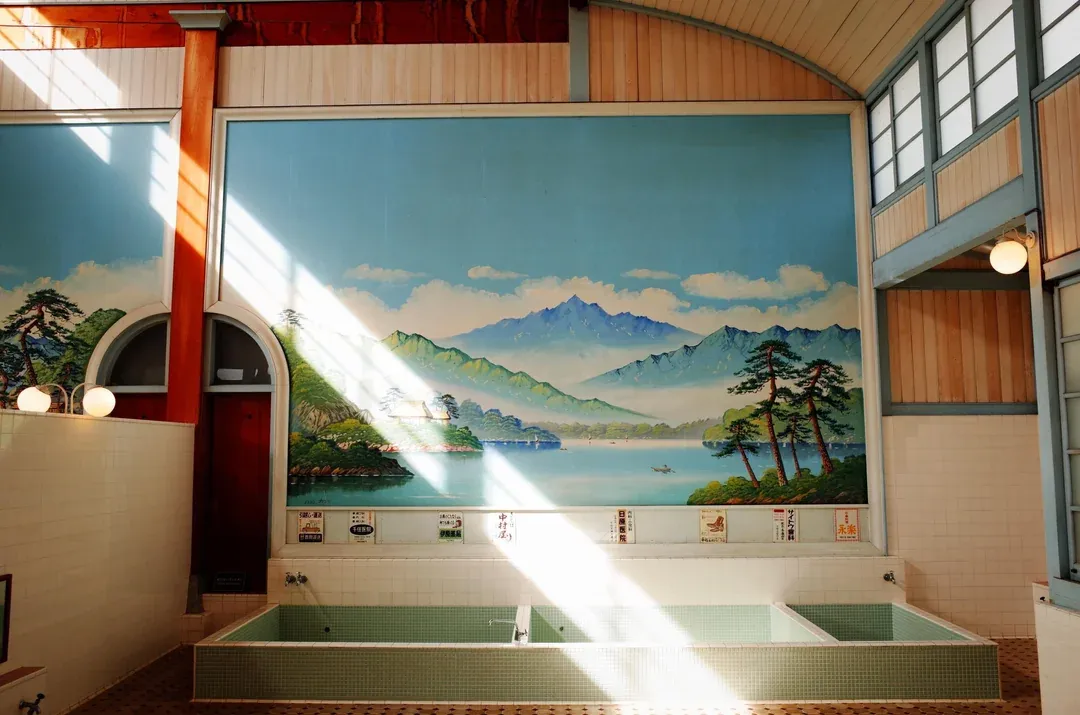
I walked into the Sento (銭湯) down the block from our AirBnb in Kyoto without much thought of what I was getting into. I was highly aware I - some out-of-town American - would stick out but, what I also worried about was fucking up the vibe at this hang out. From what I read and understood about Sento, it was where locals came to wash up after the day, relax, rejuvenate their bodies, muscles, etc., and chat with the neighborhood. The last thing I wanted was to interrupt that energy, but being a writer and an observer, it was in my nature/job description to bear witness (the best I could) rather than get in the way or steal attention.
After butchering a conversation with the kind front desk woman who had a massive green, red, and blue parrot next to her (it was asleep), I entered the dressing/prep room. Immediately, anyone in there and the bigger wash/pools/sauna area turned and looked at me. All at once, and with no fault or anger towards them, I was suddenly faced with the inextricable state of being myself, my identity and already burdensome sense of self-awareness were almost too overwhelming to handle. Then, as if to subtly show they did not give a damn that I was there at all, they went back to washing, soaking, and vibing without a word. For ten minutes I struggled to figure out how to open the locker where finally one of the bath-goers, like helping a child, showed me how.
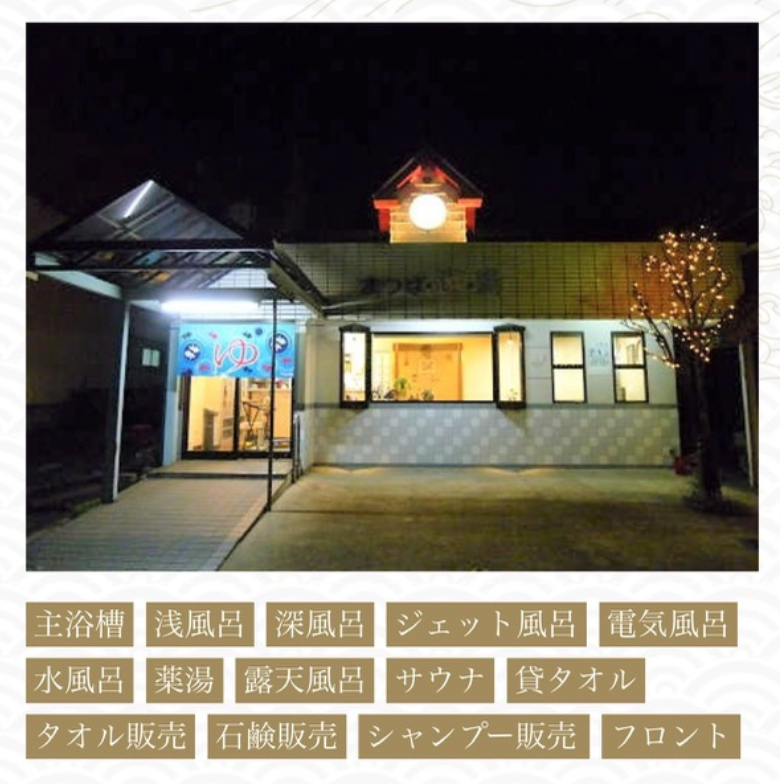
Undressing and stepping inside the bath area was when I started to panic. Mind you...I am fully naked, and my body, heavy, sluggish, and weighed down by almost two weeks of beer, ramen, 7-11 egg sandwiches (so good), and every type of onigiri known to man. I more resembled a rotten wine barrel than a 37-year-old man. Clumsy, barreling around, and adding even more embarrassment and shame to myself, I hurriedly threw water from the fountain onto my back to "wash" (this was not how one did this) to get into the hot baths as fast as possible to hide. Again, no one was paying attention to me. My paranoia was very much self-inflicted. Finally, I half-jumped into a free tub, smacked with the stinging, joyful heat instantly nuking half my anxiety as the other half observed everyone around me for information on how to do this Sento thing right.
I noted one man in what I later realized was the hottest bath out of them, holding his back against the rushing and gushing water, steadying himself with two silver, shining poles. He was completely still, his face never wincing or showing pain...truly unfazed. I watched an older man enter and throw water at the bath entrance before walking in (I still have no idea what that was about), only to look directly in my direction. I was sure this was his time, his bath, his sanctuary and yet, there I was, intruding. I kicked myself out (he ended up going directly to the sauna) and waddled over to a tub that was, and I don't mean this to be offensive, the color of a rotten avocado. I read later that the color was from natural minerals and chemical reactions in the hot spring/bath water rather than contamination. Either way, I needed sanctuary and something else to do, so I jumped in.
My time there went on like this: popping from one bath to another, taking mental notes of what bathers did where (with no fundamental notion as to why that process was the right or wrong way), and even had a nice moment with two Sento-enjoyers watching parrots fly back and forth in their cage behind some glass waist-deep in the lukewarm pool.
There was only one time I felt I was in the way...in the cold pool. One of the sento-enjoyers had a ritual, and though I was there first, that didn't matter. I had settled into the corner, eyes closed, almost reaching serenity when he plunged in. He began spinning, thrashing, and running the cold shower over his face as he bellowed in parallel with the rapid temperature change from sauna to cold pool, igniting his nerve endings. I stayed trapped in the corner until he finished, an unwilling captive audience, stuck until he returned to the sauna. Naturally, I studied his system for later use because shit...it looked like whatever he was doing was working. He was entirely free, without care or restrictions, in the comfort of his community and home. Far from any of that myself, I was nothing but envious of what he had.
Ueno Market
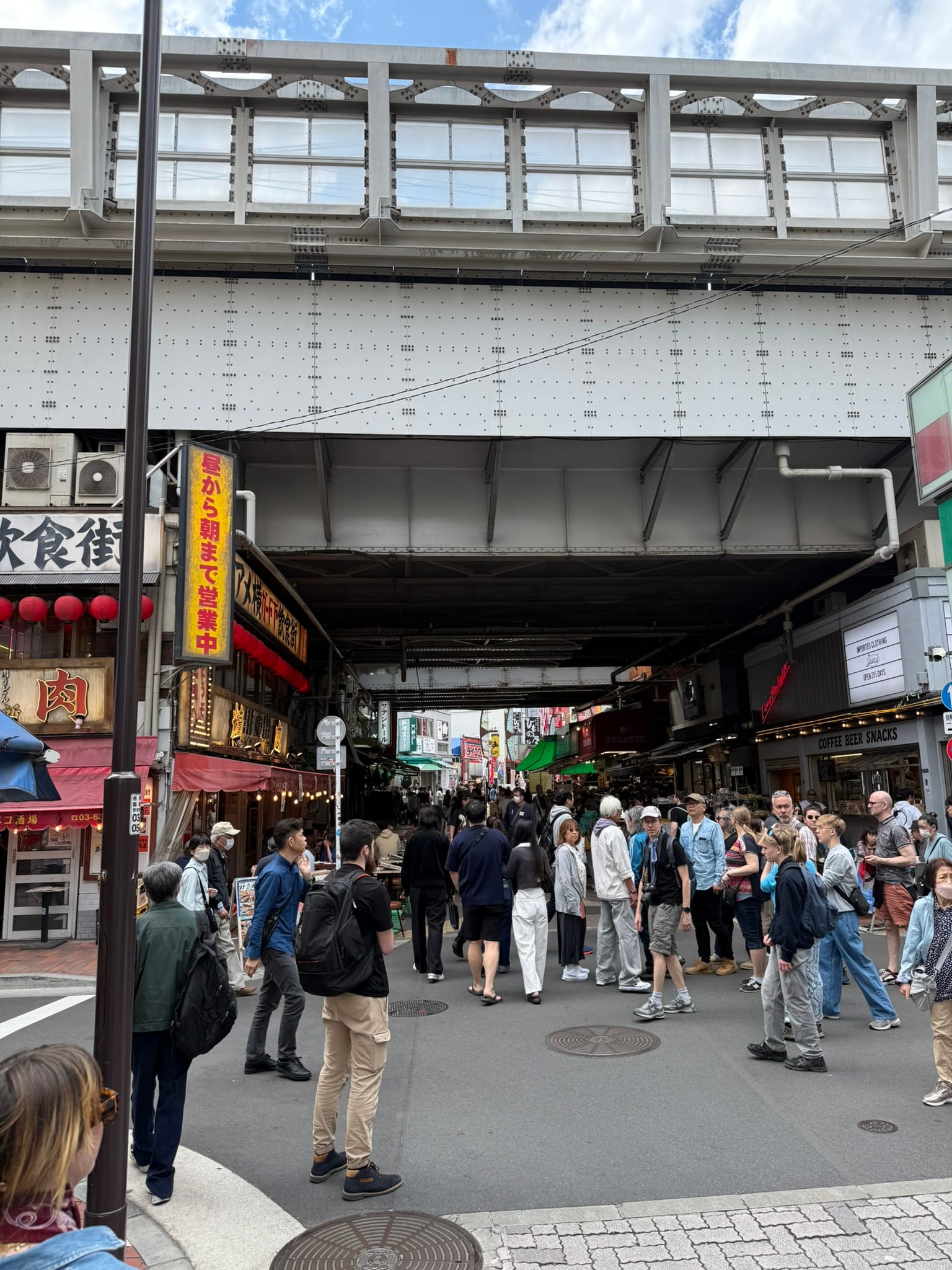
The same nightmare/daymare haunted him for weeks before their trip, yet he couldn't pinpoint where he was or what exactly the dream was about. And this dream "world" was void of anything of who he was in waking: nothing tangible or even material, no language or guideposts that helped lead him to the reality of his waking life, the one he had "worked" so willingly to construct. In this place, he was unknown to himself. Perhaps, he speculated, it is some...future thought. In this dream place, he imagined what it would have been like to be in space, where everything in all that nothing was not designed for him yet, there he was, in the beginnings of his own...and humanities...own creation.
He tried to describe this dream-state to his wife and close friends as suddenly being plopped into a fog with no walls or ceilings or floors. They would nod, worriedly, and advise what he knew already to be true: get more sleep, don't think too much, relax. I'm doing that, he thought. Like most things, maybe it was never enough.
There was another characteristic within it all: the feeling of the dream, though it's hard to say if it's what he felt during it or afterwards. Either way, foreboding, remorse, and forgetfulness all hung heavy during or thereafter. There were no positives that he could remember unless you believe a neutral, one-note emotion deserves to be categorized as one or, the other. And one more weird detail...the number 40. He saw that number not as a number but as a warning of what would come.
It came with stern advice: do it all (or at least the best you can).
This was his view when his wife hit Ueno, a district in Taitō, Tokyo, where it felt like there was nothing you couldn't have. Do you desire an edible fox mask? You can buy that for next to nothing! Top-tier, so-fresh-it-makes-you-cry stand-up sushi and sashimi with a 32oz beer and sake? Right this way. What about a spicy bowl of noodle lava that makes you sneeze with every bite but you can't stop because it's so good? Do you want a million different types of hats? We have that.
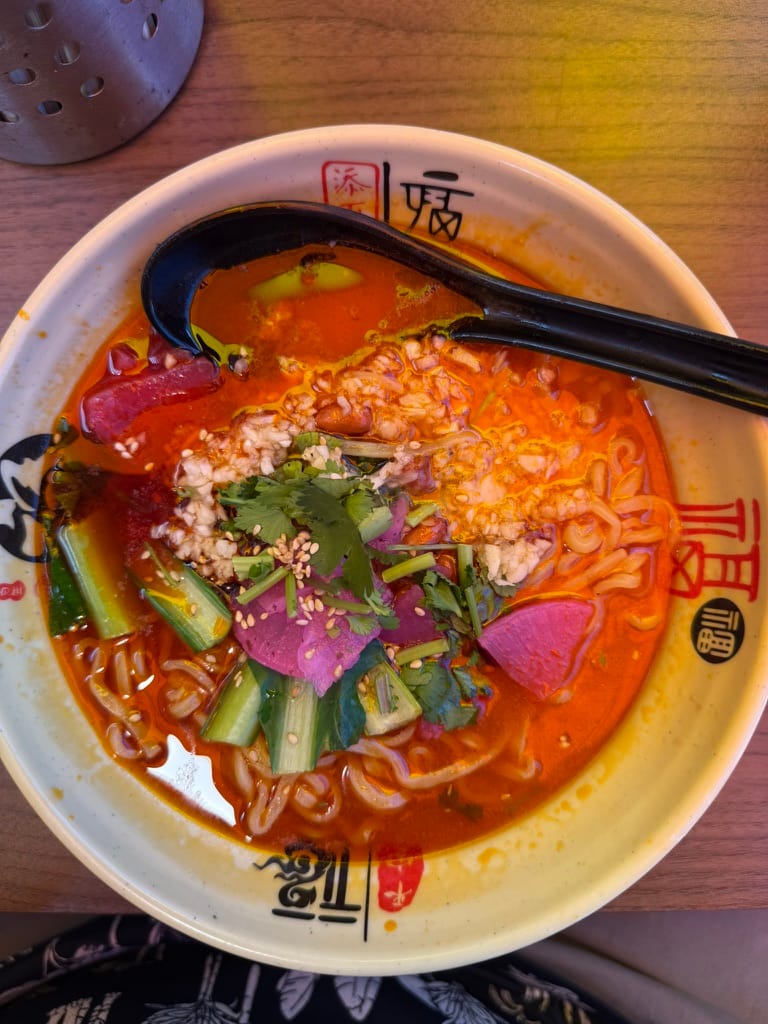
Up and down, down and up the streets of Ueno, they lost themselves in all of this and time, stripped of the invisible hand and restrictions that dictated their every action back home. Here, the very purpose of their pursuits...from money for future security, present joys, or the means for future frivolity...was not judged but laid naked. The choices behind these ends quietly revealed themselves with every step and turn and spot they entered and exited. Bob Dylan once said, "You’re going to die. You’re going to be dead. It could be 20 years, it could be tomorrow, anytime. So am I. I mean, we’re just going to be gone. The world’s going to go on without us. All right now. You do your job in the face of that, and how seriously you take yourself you decide for yourself." It kind of felt like that.
In this temporary pause of tick-tock, they were fully present amidst the five-sense madness of those streets: a crowd erupting in laughter from a joke they would never hear; a chef in the back of a restaurant reading a textbook on a break, dreaming of escape; duck ramen, for which they'd queued an hour, proving to be the best thing they had ever tasted; the train overhead, carrying countless lives destined to bloom in countless directions; lovers quarreling at a tiny outdoor restaurant table, then falling back in love over food and drink; gamblers fixed on one more win; barkeeps smoking cigarettes on their break, an unread newspaper tucked in their armpit; and the moon overhead, offering only light and the quiet presence of other celestial bodies that felt...quite selfishly...like they were there only for them until they eventually moved on to the next and the next and the next.
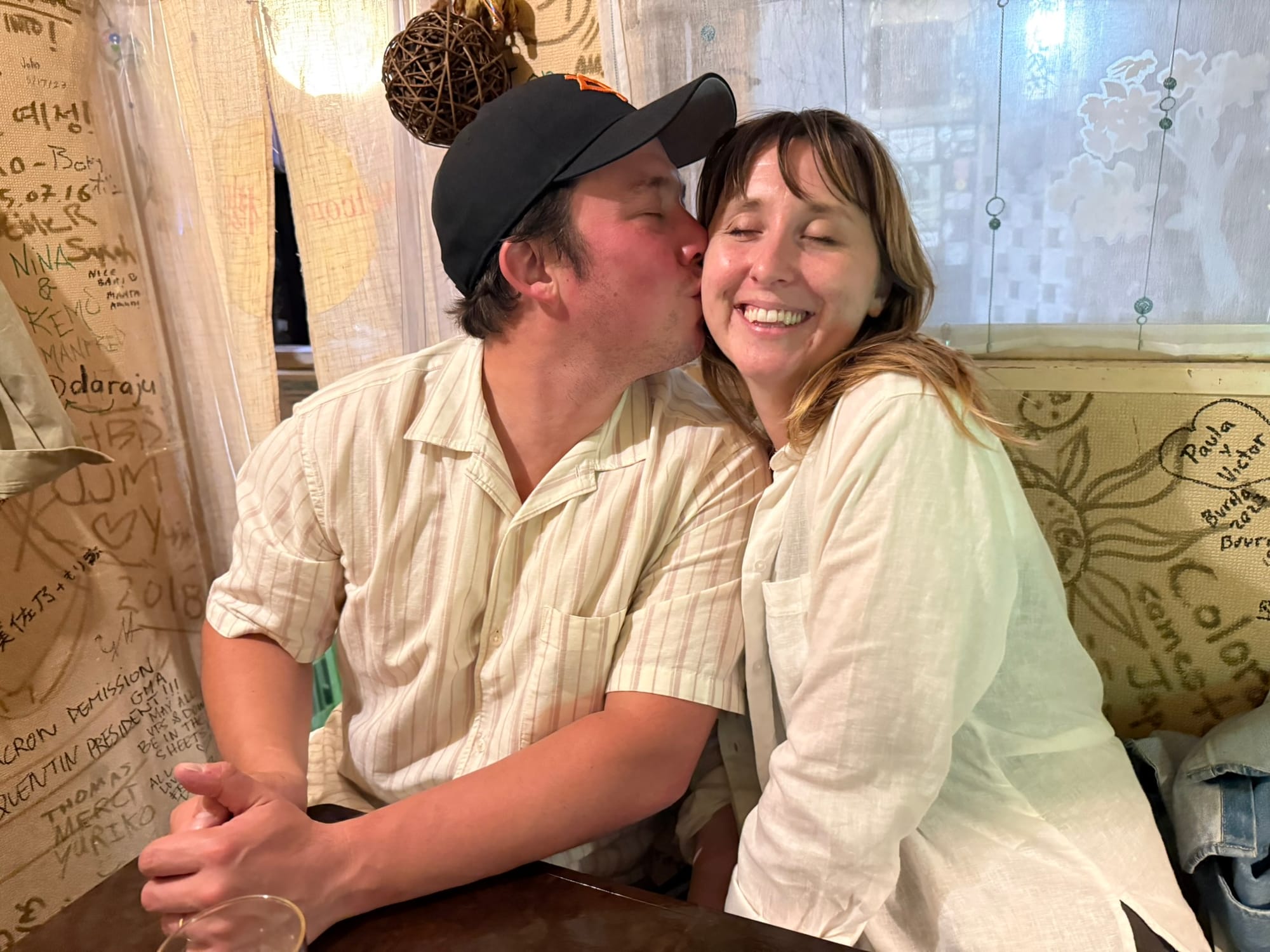



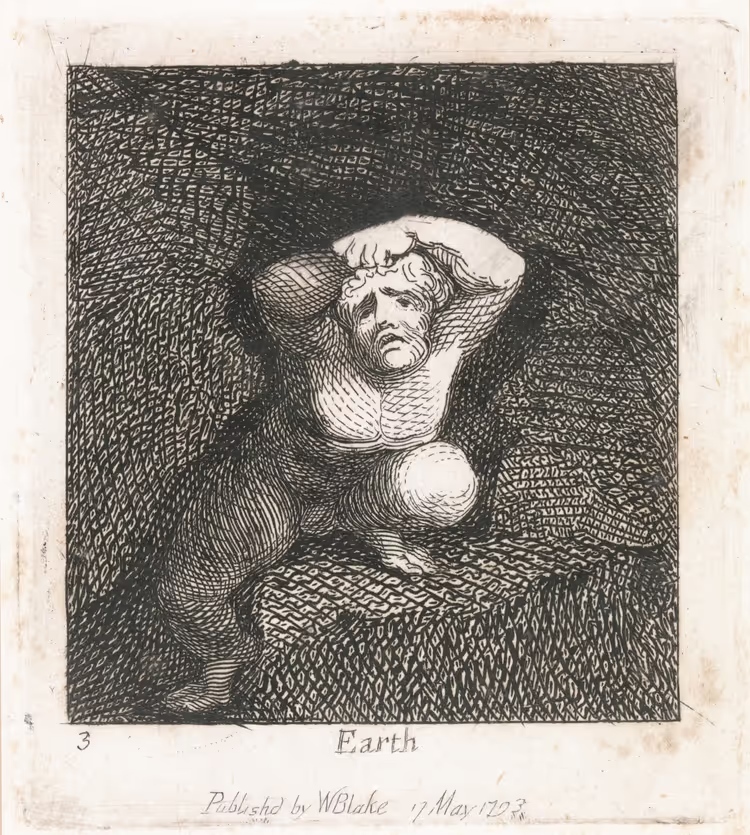
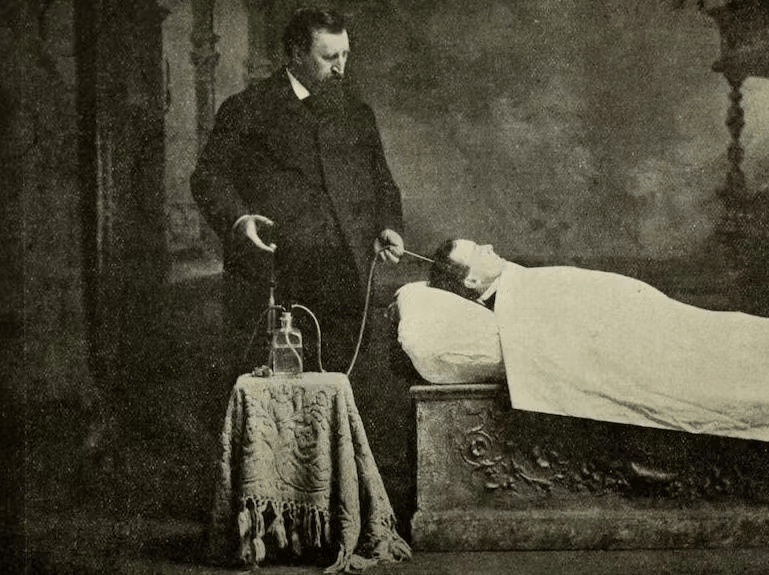
Member discussion